California Labor Law Guide
A comprehensive guide to California labor laws: Covering key topics, including minimum wage regulations, overtime provisions, mandated breaks, hiring and termination procedures and other miscellaneous employment laws.
Key Takeaways
- California has been a leader in advocating for increased minimum wages, with the current rate set at $16 per hour, much higher than the federal minimum wage and many other states.
- Some cities and counties in California have established higher minimum wages to adapt to their unique economic conditions.
- California labor laws include provisions for daily and weekly overtime pay to ensure fair compensation for nonexempt employees.
- Overtime pay is calculated at 1.5 times the regular rate for hours worked beyond eight in a day and up to 12 hours.
- Double the regular rate is required for hours worked beyond 12 in a day or over eight hours on the seventh consecutive day of work in a week.
- California mandates specific break periods for most workers, including a 30-minute unpaid meal break when working over five hours in a day and a 10-minute paid rest break for every four hours worked.
- The California Family Rights Act (CFRA) provides up to 12 weeks of job-protected leave for various family and medical needs, covering employees at companies with five or more employees.
Minimum Wage Regulations in California
California, often considered a trendsetter in labor and employment law, has been at the forefront of the nationwide push for increased minimum wages.
With a current minimum wage of $16 per hour for all employers, California's minimum wage is substantially higher than the federal minimum wage and state minimum wages in many other U.S. states.
| State/District | Minimum wage |
| Alabama | $7.25 |
| Alaska | $11.73 |
| Arizona | $14.35 |
| Arkansas | $11 |
| California | $16 |
| Colorado | $14.42 |
| Connecticut | $15.69 |
| Delaware | $13.25 |
| Florida | $13 |
| Georgia | $7.25 |
| Hawaii | $14 |
| Idaho | $7.25 |
| Illinois | $14 |
| Indiana | $7.25 |
| Iowa | $7.25 |
| Kansas | $7.25 |
| Kentucky | $7.25 |
| Louisiana | $7.25 |
| Maine | $14.15 |
| Maryland | $15 |
| Massachusetts | $15 |
| Michigan | $10.33 |
| Minnesota | $10.85 |
| Mississippi | $7.25 |
| Missouri | $12.3 |
| Montana | $10.3 |
| Nebraska | $12 |
| Nevada | $12 |
| New Hampshire | $7.25 |
| New Jersey | $15.13 |
| New Mexico | $12 |
| New York | $15 |
| North Carolina | $7.25 |
| North Dakota | $7.25 |
| Ohio | $10.45 |
| Oklahoma | $7.25 |
| Oregon | $14.2 |
| Pennsylvania | $7.25 |
| Rhode Island | $14 |
| South Carolina | $7.25 |
| South Dakota | $11.2 |
| Tennessee | $7.25 |
| Texas | $7.25 |
| Utah | $7.25 |
| Vermont | $13.67 |
| Virginia | $12 |
| Washington | $16.28 |
| West Virginia | $8.75 |
| Wisconsin | $7.25 |
| Wyoming | $7.25 |
| District of Columbia | $16.5 |
[Source: FRED]
Furthermore, there are additional provisions for future increases, with the minimum wage scheduled to rise to $16 on January 1, 2024.
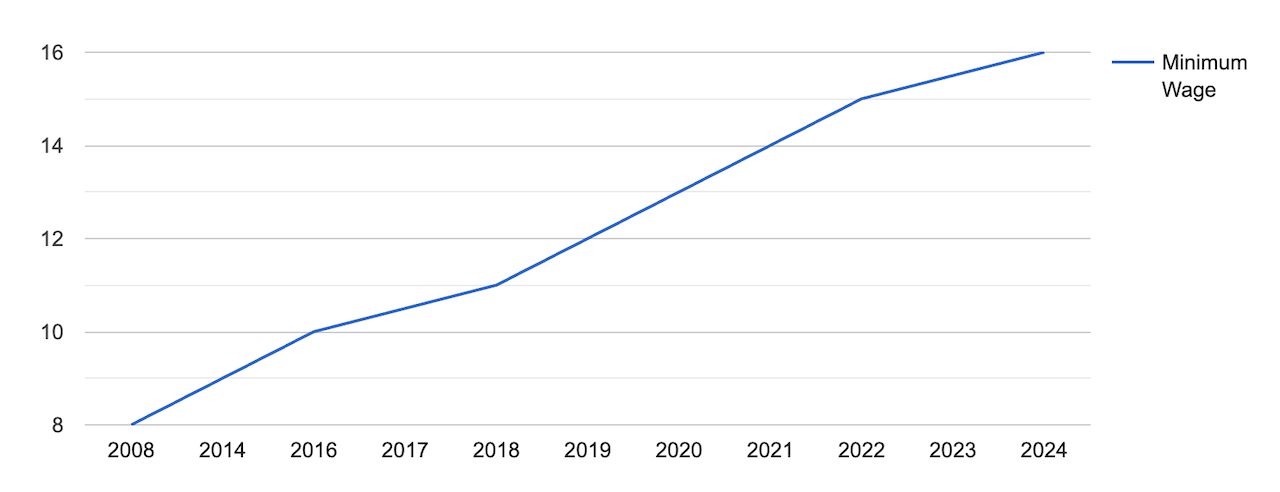
[Source: State of California Department of Industrial Relations]
Some cities and counties within the state have established higher minimum wages than the statewide rate, reflecting the need to adapt to the unique economic conditions of those regions.
The table below shows the minimum wage rates for these localities:
[Source: UC Berkeley Labor Center]
Overtime Rules and Regulations in California
California labor laws include specific provisions governing overtime pay to ensure fair compensation for nonexempt employees. These regulations, outlined in the California Labor Code, establish the following general overtime provisions:
- Daily overtime: A nonexempt employee, aged 18 or older, or a minor employee aged 16 or 17 who is not required by law to attend school and is not otherwise prohibited from engaging in the subject work, shall not be employed for more than eight hours in any workday.
- Weekly overtime: Similarly, nonexempt employees shall not be employed for more than 40 hours in any workweek.
In cases where nonexempt employees work beyond these standard hours, they are entitled to receive overtime pay, which is calculated as follows:
- For all hours worked over eight hours in any workday and up to 12 hours, employees must receive one and one-half times their regular rate of pay.
- For the first eight hours worked on the seventh consecutive day of work in a workweek, employees are also entitled to one and one-half times their regular rate of pay.
- Any hours worked in excess of 12 hours in any workday and all hours worked in excess of eight on the seventh consecutive day of work in a workweek are subject to double the employee's regular rate of pay.
There are, however, various exemptions to the general overtime regulations. An "exemption" refers to specific employee classifications to which the standard overtime law does not apply.
Additionally, there are "exceptions" that outline special rules for overtime payment for certain groups of employees.
Break Periods in California
California mandates specific break provisions to ensure the well-being of its workers. Most employees in the state must receive the following breaks:
- 30-minute unpaid meal break: When working more than five hours in a day, employees are entitled to an uninterrupted 30-minute unpaid meal break.
- Additional 30-minute unpaid meal break: If employees work more than 12 hours in a day, they are entitled to an additional 30-minute unpaid meal break.
- Paid 10-minute rest period: For every four hours worked, employees must receive a paid 10-minute rest period.
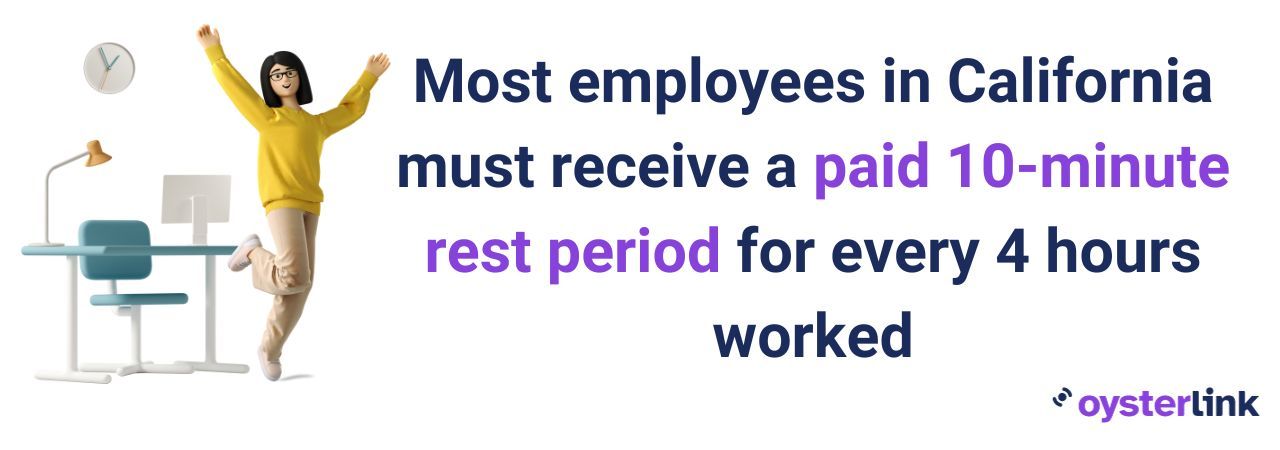
Certain worker categories, such as domestic workers and farm workers, are covered by different meal and rest break laws. Further details on meal periods and rest periods can be obtained from the Labor Commissioner's website.
Additionally, outdoor workers have specific rights aimed at preventing heat illness. Employers must allow outdoor workers to take breaks as needed to cool off in the shade, ensuring their safety and well-being in potentially extreme weather conditions.
Family and Medical Leave Laws in California
The California Family Rights Act (CFRA) is a crucial piece of legislation that ensures job-protected leave for California workers facing family and medical needs.
It covers California employees at companies with five or more employees, offering job security when it matters most. To be eligible, employees must have one year of service with their employer and have worked at least 1,250 hours within the last year.
CFRA provides up to 12 weeks of job-protected leave, allowing employees to address important life events, such as:
- Bonding with a new child
- Caring for seriously ill family members
- Dealing with their own serious health conditions
While CFRA does not require employers to provide pay during this leave, it does ensure that employees with employer-provided health coverage can maintain their healthcare benefits.
Moreover, the CFRA bonding period begins after Pregnancy Disability Leave, allowing mothers to recover from childbirth before starting their 12 weeks of bonding leave.
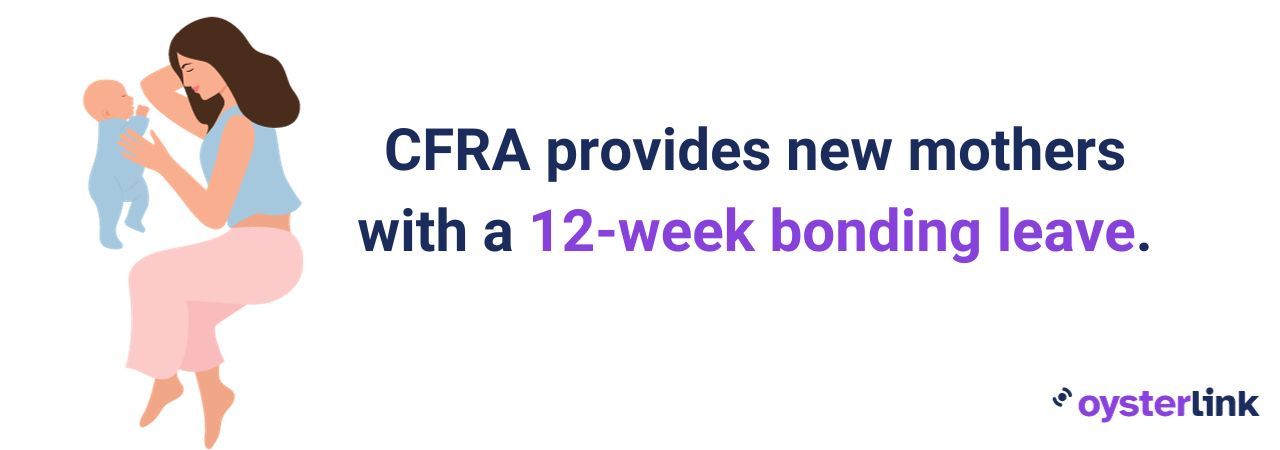
Notably, CFRA often coincides with the federal Family and Medical Leave Act (FMLA), offering strong job protection and support for California workers during pivotal family and health-related moments.
The following chart offers valuable insights into the nature of FMLA complaints on a national scale, providing a broader perspective:
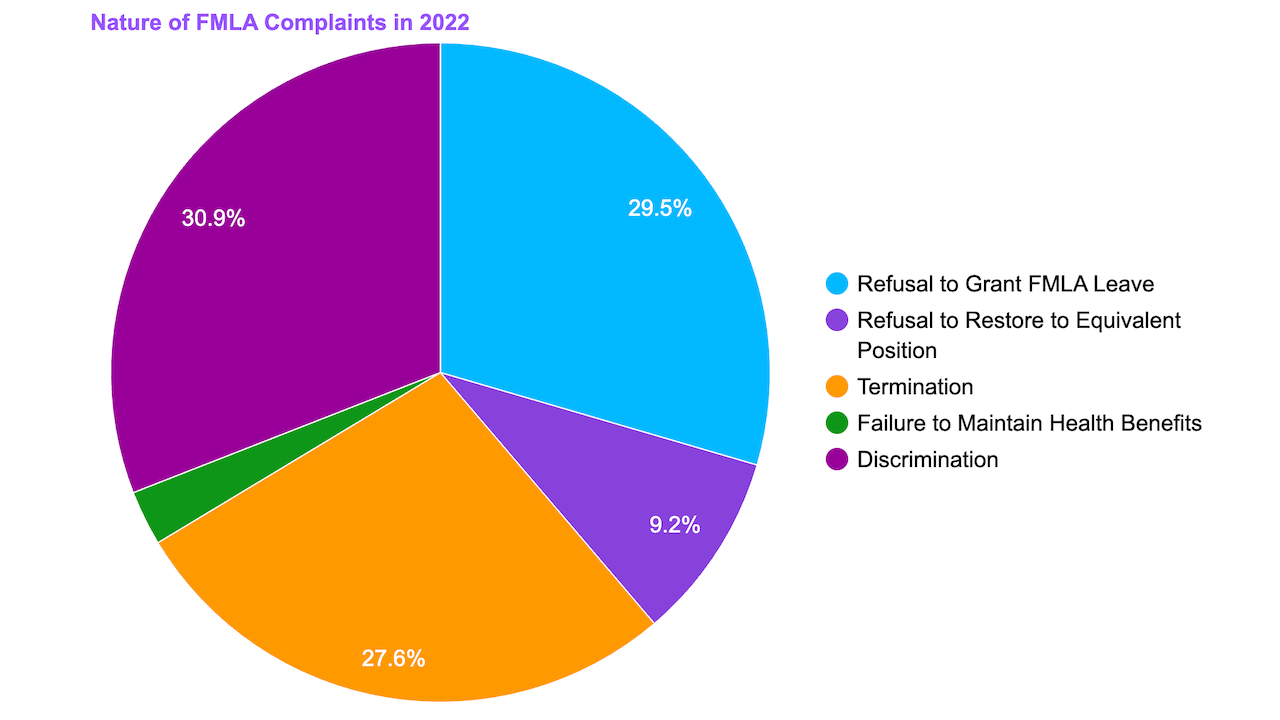
[Source: U.S. Department of Labor]
Child Labor Laws in California
California has stringent child labor laws in place to protect the well-being and education of minors.
California child labor laws apply to young workers under the age of 18 and encompass various aspects of employment, including hours of work, types of jobs and the issuance of work permits.
Here is an overview of these laws:
[Source: State of California Department of Industrial Relations]
Anti-Discrimination and Fair Employment Practices in California
California’s Fair Employment and Housing Act (FEHA) prohibits discrimination based on a wide range of characteristics, including:
- Race
- Color
- Ancestry
- National origin
- Religion
- Age (40 and over)
- Disability (mental and physical)
- Sex
- Sexual orientation
- Gender identity
- Gender expression
- Medical condition
- Genetic information
- Marital status
- Military or veteran status
Discrimination is forbidden in all aspects of employment, from advertisements to hiring, promotion and working conditions. These protections extend to participation in training programs, employee organizations and unions.
FEHA applies to employers with five or more employees, and they are prohibited from discriminating against job applicants and employees based on these protected categories. It is also illegal for employers to retaliate against individuals who assert their rights under the law.
For those who experience employment discrimination, remedies available under state law include
- Back pay
- Front pay
- Reinstatement
- Out-of-pocket expenses
- Policy changes
- Training
- Reasonable accommodations
- Damages for emotional distress
- Punitive damages
- Attorney's fees and costs
Independent Contractor Classification in California
In California, the classification of a worker as an employee or an independent contractor is primarily governed by the "ABC test."
To be classified as an independent contractor, a worker must satisfy all three conditions set forth by this test:
A. Control and direction: The worker must be free from the control and direction of the hiring entity concerning the work, both as stipulated in the contract and in practice. This means that the worker should have substantial autonomy in how they perform their tasks.
B. Nature of work: The work performed by the individual must be outside the usual course of the hiring entity's primary business. In other words, the worker should not be engaged in tasks that are central to the hiring entity's core operations.
C. Independently established trade: The worker must be involved in an independently established trade, occupation or business of the same nature as the work they are performing for the hiring entity. This criterion reflects the worker's ability to operate as a distinct business entity.
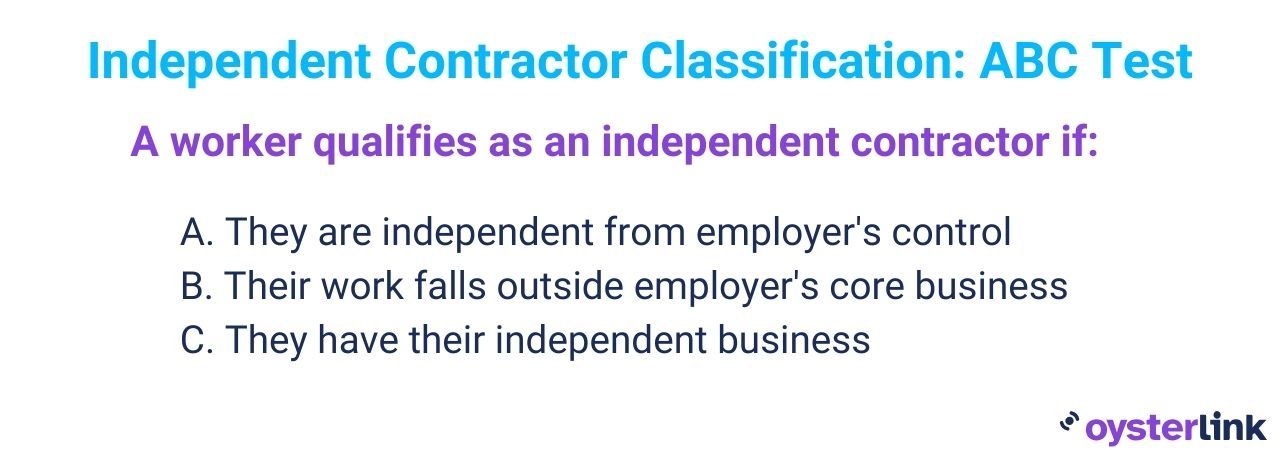
The distinction between employee and independent contractor is of critical importance because it determines the legal protections and rights afforded to the worker.
If a worker is classified as an employee, they are entitled to a wide range of labor rights and protections under California law. These rights include:
- Minimum wage: Employees are entitled to receive at least the minimum wage for all hours worked.
- Overtime pay: Employees are eligible for overtime pay when they work more than a certain number of hours in a day or week.
- Meal periods and rest breaks: Employees have the right to take legally mandated meal and rest breaks during their work shifts.
- Workplace safety: Employees are protected by workplace safety laws and regulations that require employers to maintain safe working conditions.
- Retaliation protections: Employees are safeguarded against retaliation by employers for asserting their rights or reporting workplace violations.
- Access to state agencies: Employees can seek enforcement of these laws and protections through state agencies like the Labor Commissioner's Office.
Independent contractors do not benefit from these wage and hour protections, workplace safety regulations or anti-retaliation safeguards.
Instead, they must address issues related to their work and contracts through alternative means, often involving negotiations and legal action outside of employment law.
Termination and Final Paychecks in California
California is an at-will employment state. This means that, without a specific employment contract in place, either the employer or the employee can terminate the working relationship at any time, with or without cause.
When navigating California labor laws and termination procedures, make sure you're equipped with financial clarity. Our Paycheck Calculator allows you to estimate your earnings after accounting for taxes and deductions, tailored to your state's tax laws.
When it comes to final paychecks, California labor laws outline the following requirements:
Final Pay for Discharged Employees
Employees who are discharged must receive all wages due to them at the time of termination. This includes any earned but unused vacation pay. The final paycheck for a discharged employee must be provided at the place of discharge.
Final Pay for Employees Who Chose To Resign
When an employee who doesn’t have a written agreement for a definite period of employment decides to quit, the final paycheck must be provided within 72 hours.
If the employee gives at least a 72-hour notice before quitting, the wages must be paid at the time of quitting. An employee who quits must receive their final wage payment at the office or agency of the employer in the county where the employee worked.
In cases where an employee quits without providing a 72-hour notice, they may request that their final wage payment be mailed to a designated address, with the date of mailing considered the date of payment.
Penalties for Late Payment
If an employer willfully fails to pay any wages due to an employee who is discharged or quits within the specified time frames, they may be assessed continuing wages as a penalty from the date the wages were due, up to a maximum of 30 days.
This penalty is calculated by multiplying the daily wage rate of the employee by 30 days. However, employers can avoid these penalties if they can demonstrate that a good-faith dispute existed regarding whether wages were due.
It's essential to note that even if there is a dispute, the employer must pay the undisputed wages without requiring a release; otherwise, the "good faith" defense will be defeated.
Summary of California Labor Laws
California is a pioneering state in labor and employment law, boasting a minimum wage of $16 per hour, well above federal and state minimums. Some cities and counties in California have even established even higher minimum wages to adapt to their unique economic conditions.
California's labor laws include robust provisions for overtime, ensuring fair compensation for nonexempt employees. Both daily and weekly overtime regulations dictate that employees must receive additional pay for working beyond specified hours.
10-minute paid rest breaks and 30-minute unpaid meal periods are mandated by California law to prioritize worker well-being.
The California Family Rights Act (CFRA) stands as a crucial piece of legislation, providing up to 12 weeks of job-protected leave for eligible employees facing family and medical needs. It covers companies with five or more employees and safeguards healthcare benefits while on leave.
The state operates under an at-will employment system, allowing either the employer or employee to terminate employment at any time.
When employment is terminated, employees must be promptly paid all wages owed, including any earned but unused vacation pay.
Frequently Asked Questions About California Labor Laws
Does California give 10 or 15-minute breaks?
California labor law requires that employees be given 10-minute paid rest breaks for every four hours worked. There are no mandatory 15-minute breaks in California.
Can you work 60 hours a week in California?
In California, you can work up to 60 hours a week. However, any hours worked beyond 40 in a workweek must be compensated at the overtime rate, which is 1.5 times the regular rate of pay.
Can I work 21 days in a row in California?
Generally, you can’t work 21 days in a row in California. Most employees are entitled to one day of rest every seven consecutive days of work.
Can I skip my 30-minute break in California?
In California, employers are required to provide a 30-minute unpaid meal break for employees who work more than five hours a day. Employees can voluntarily choose to skip this meal break, but employers must offer and encourage them to take it.
What is a meal penalty in California?
A meal penalty in California is a financial penalty that employers must pay to employees if they do not provide a legally required meal break. The penalty is one hour of pay at the employee's regular rate for each workday for which the meal break is not provided.
Disclaimer: This information serves as a concise summary and educational reference for California state labor laws. It does not constitute legal advice. For personalized legal guidance, it is recommended to consult with an attorney.
